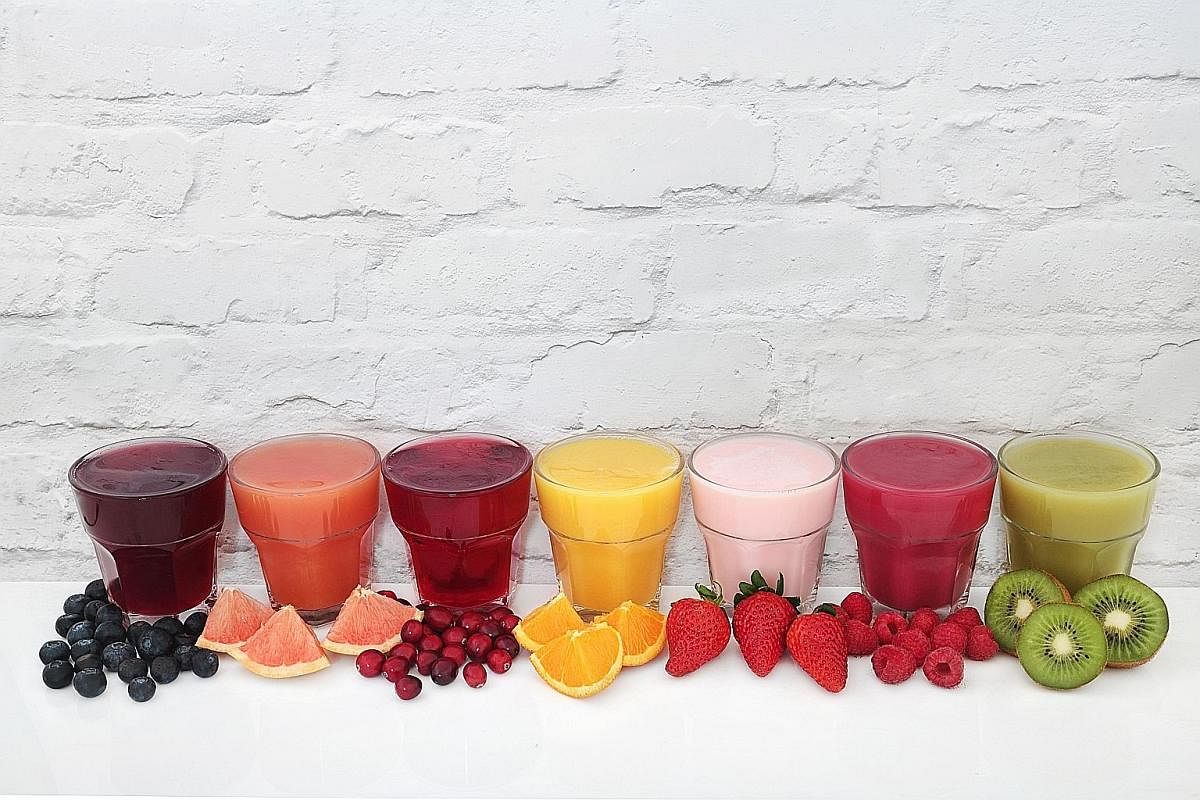Fruit juice for children: Nutritious drink or just sugar water?
Experts say nothing beats eating the whole fruit as juicing strips fibre off, but the juice will still contain some nutrients such as vitamin C and folate


Twice a week, Mrs Melissa Lee presses fruit juice for her three- year-old son Ryan, to supplement his diet, as he neither chews well nor likes to eat whole fruit.
After doing this for two years, her husband suggested to her last week to stop giving him fruit juice because he had read a Washington Post article debunking its perceived benefits.
Published a few weeks ago, the piece was written by three medical experts from the United States. They argue that even freshly pressed, 100 per cent juice is "little more than sugar water" and that juice ought to be re-branded "from a health food to a treat", as children who are regular juice- drinkers end up being shorter, fatter and more prone to diabetes in adulthood.
After reading the article, Mrs Lee, 34, says she was taken aback by its assertions.
Eventually, she and her husband, who also have a one-year-old daughter, decided they would continue to give Ryan fruit juice.
Mrs Lee, who is self-employed, says: "I don't feel that the idea of giving fruit juices is that bad. I don't want to let myself be alarmed by the article."
Local dietitians and nutritionists tell The Sunday Times they agree with certain points raised in the article, but not others.
They concur that fruit juice offers no nutritional benefits over whole fruit for children, and it should not be considered a replacement for fruit to meet a person's recommended daily fruit intake.
Dr Kalpana Bhaskaran, a nutritionist at the Singapore Nutrition and Dietetics Association, puts it this way: "The benefits of eating a fresh, whole fruit are greater than the sum of its parts."
The experts also agree that fruit juice should be given only as a treat because of its high sugar content.
The Nutrition Clinic's co-founder Pooja Vig says that because the juicing process strips fruit of its dietary fibre, pulp and skin, fruit juice is a concentrated source of natural sugars.
"When you consume fruit juice, you are ultimately giving yourself a sugar shot," she says.
Dietitian Derrick Ong, founder of Eat Right Nutrition Consultancy, says the article has a slightly alarmist tone because it seems to "demonise" fruit juices.
While he agrees that valuable nutrients do get lost in the process of juicing, other nutrients such as vitamin C and folate - which are essential for building healthy tissues and blood cell development - are retained.
Dr Kalpana too agrees that fruit juice is not devoid of nutrients.
"Juice does contain antioxidants and carbohydrates," she says.
Boxed juices are also not necessarily inferior to freshly pressed or cold-pressed juices, adds Mr Ong, as these are likely to be pasteurised to preserve the nutrients.
But he advises the consumption of freshly pressed and cold-pressed juices as soon as possible to avoid further nutrient losses through exposure to the air.
Citing some medical studies, National Healthcare Group Polyclinics' senior dietitian Lynette Goh suggests that juice should be limited to 120 to 180ml a day for children older than one year old.
She agrees with the article that the excessive intake of juice can lead to extra calories, weight gain and obesity and that, in turn, will increase the risk of diabetes.
However, she adds: "Drinking juice itself does not contribute to diabetes."
The experts suggest that for parents such as Mrs Lee, whose children do not take well to fruit, they could consider making smoothies instead.
The whole fruit is blended in a smoothie, which means the dietary fibre is retained.
When nuts and calcium-rich fluids such as milk are added into the mix, the resulting smoothie packs more of a punch than fruit juice.
Another option for parents is to dilute the fruit juice by adding vegetables.
Ms Pooja says: "When you juice vegetables along with fruit, you are getting concentrated nutrients, and you are diluting the sugar content in the juice."
This suggestion is something that Ms Praise Phuan currently adopts with her two children, Goderick, nine, and Yenise, 11.
The 38-year-old helps to run vertical vegetable farm Packet Greens, and makes cold-pressed juices for her children once a week on average because they do not like to eat fruit or vegetables.
Her juice blends are a mix of ingredients such as kale, lettuce, beetroot, orange, carrot and lemon.
She does not add any syrup or sugar and feels that this is the best way she can get her children to consume more fruit and vegetables.
"I know what I'm juicing for them and my children enjoy it," she says.
Join ST's Telegram channel and get the latest breaking news delivered to you.
A version of this article appeared in the print edition of The Sunday Times on May 14, 2017, with the headline Fruit juice for children: Nutritious drink or just sugar water?. Subscribe

